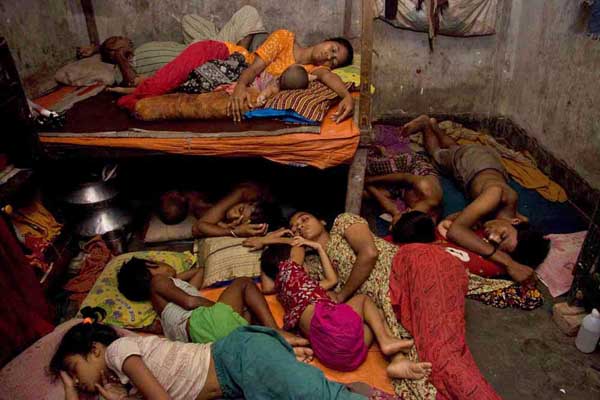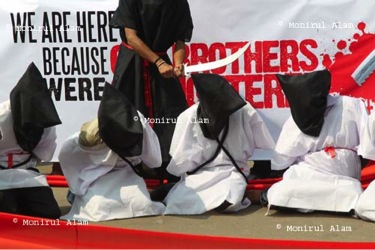‘Where is Democracy?’ based on Kolaveri D , is a satire on the state of democracy in Gujarat. Exposing the myth of Vibrant Gujarat the song raises questions about corruption, poverty, women’s conditions, the atmosphere of fear and how the image of one leader has been promoted while others have been pushed to a corner. Sung by Priyank Upadhyay, it has been directed and shot by young Anhad filmmaker Arma Ansari. While Manish Dhakad has acted in the music video, words by Shabnam Hashmi .
Category: Poverty
Amartya Sen: The New Elizabethans
Amartya Sen: BBC
DURATION: 12 MINUTES
Best known for his work on the causes of famine, his book Poverty and Famines: An Essay on Entitlement and Deprivation, argued that famine occurs not only from a lack of food, but from inequalities built into mechanisms for distributing food. Sen also helped to create the United Nations Human Development Index which is used to rank countries by standard of living or quality of life.
Now working as Professor of Economics and Philosophy at Harvard University, he began at the tender age of twenty-three by setting up a new economics department at Jadavpur University in Calcutta, but he has also held professorships at Delhi University, the London School of Economics and the University of Oxford.
When in 1998 he was appointed Master of Trinity College, Cambridge, he became the first Asian academic to head an Oxbridge college. In the same year he received the Nobel Memorial Prize in Economic Sciences for his work in welfare economics.
The New Elizabethans have been chosen by a panel of leading historians, chaired by Lord (Tony) Hall, Chief Executive of London’s Royal Opera House. The panellists were Dominic Sandbrook, Bamber Gascoigne, Sally Alexander, Jonathan Agar, Maria Misra and Sir Max Hastings.
They were asked to choose: “Men and women whose actions during the reign of Elizabeth II have had a significant impact on lives in these islands and/or given the age its character, for better or worse.”
Human Rights Through Visual Storytelling
Pathshala alumni Taslima Akhter shortlisted in AnthropoGraphia

Continue reading “Human Rights Through Visual Storytelling”
The Barefoot College
In Rajasthan, India, an extraordinary school teaches rural women and men — many of them illiterate — to become solar engineers, artisans, dentists and doctors in their own villages. It’s called the Barefoot College, and its founder, Bunker Roy, explains how it works.
While Awami League Fiddles
While the nation mourned for the hundreds killed in the launch disaster. Awami League party members were seen in truck convoys celebrating to band music.
Dozens Dead After Ferry Capsizes in Bangladesh
By NIKHILA GILL and SRUTHI GOTTIPATI
New York Times
Published: March 13, 2012
Photos by Abir Abdullah/EPA
NEW DELHI ? Rescuers were searching for survivors on Tuesday after a ferry carrying as many as 200 passengers capsized in Bangladesh, killing at least 24 people with many more feared dead.

Continue reading “While Awami League Fiddles”
Dare to Share? (Thanksgiving Thoughts)
Subscribe to ShahidulNews
By Arjun Janah
![]()
I wander off, from working life, to see and hear what’s new,
And here is what I find — which now is openly in view.
I see the people in two camps (though some are in-between)
And one of them is calling for an ending that’s obscene.
They’re calling for the cops to do what those for hire do best,
To beat up on the ones who dare, their binding chains, to test.
But since the ones who’re testing are these students, who are white,
Or women who are white as well, this gives the rest a fright.
For pepper spray and rods and boots, when used on those who’re darker
Or poorer may be quite okay — and safely out of sight,
Or even guns and bullets, used when we’re asleep at night,
But when it’s done in daylight, with reporters gathered near,
To those who’re lighter, richer — why, then some refuse to cheer,
Though others still approve — and only wish they’d done it sooner.
To both these camps, the other one is certifiably lunar!
And here’s what those in power are now thinking. Hear them say,
To others of their kind, “Let’s stop this wretched thing, today!
“For if some question, what was held for longest time as true,
Then what’s to save some other things from critical review?
We bomb the regions far away — and people burn in hells.
But see, there are no pictures and that story, no one tells.
But what to do when people rise up here, in this, our street,
Or merely sit — near places where we one-percenters meet?
They circumvent the ban on mikes by echoing together!
They point out things that no one did without the tar and feather!
They even give out food and books — and people pause to think…
They’re rodents! If not driven out, this ship of ours might sink!
So hear our drums of war and how we beat them, till at last
Our lust for blood is satisfied. But has the danger passed?
Oh no! These books they distribute, in public in the square,
Must now be gone! And so must those, who advocate we share!”
I wondered off, from working life, and this I saw and heard.
I wondered loud, if rich should share. But I was called a turd.
But here is what some others said, who came to my defense,
And what they said, to me at least, made somewhat better sense.
“Remember that the ones who lived, in this, our bounteous land,
Remembered those who came by ship, but did not understand
The land or cultures that were here. They were, by climate, beaten
And surely would have perished — as do all who haven’t eaten
The season long. But natives came — and gave, it’s said, of maize,
Of turkey and of other things. This did the saved amaze
And they gave thanks (as we still do) not to the ruddy “Indians”
But to their God, their Savior Christ, in these, their new “dominions”.
And natives gave them implements — and other things they needed,
For they were used to sharing all — and those, in trouble, heeded.
But when one needed something back, and asked, this raised a fever
On those who understood him not, and called him, “Indian giver!”
And so it’s been. They’re vanished now, the ones who knew to share…
But should, in turn, these folk depart — who now, to sharing, dare?
Babui / Arjun
2011 November 24th, Th. (Thanksgiving Day)
Brooklyn
Be-heading `parched souls' in modern Saudi Arabia
Subscribe to ShahidulNews
![]()
By rahnuma ahmed
Ma, my soul feels parched. It quivers like a kite.
(`ma, amar attay pani nai, atta ghuddir moto khali orey’)
— Masud Hossain of Purbashinda village, Tangail, one among eight be-headed
in Saudia Arabia on October 7, 2011.
Chopped off in a clean stroke, his head rolled away. His body slumped, it hit the ground.
He had been made to kneel, to wait. A parched soul, quivering inside.
Alongwith seven other young men — Suman from Kishoreganj, Mamun, Suman and Shafiq from Tangail, Faruque from Comilla, Abul and Matiar from Faridpur — Masud was found guilty of murdering Hussain Saeed, an Egyptian security guard in April 2007. They’d allegedly been apprehended stealing cable from a warehouse. All eight were sentenced to death, the following year.

Faruk, the eldest among five sons, worked as a tractor-driver before going to Saudi Arabia as a cleaner. He was a very good boy, said Daudkandi’s union chairman. Twenty-seven year old Suman of Kishoreganj went when he was only 18, earnings sent back had not yet freed the mortgaged family land. My cousin and a muktijoddha union porishod member have been feeding us for the last six months, said his father. Abul too, had gone as a cleaner. His wife left him after he was convicted, say press reports, to re-marry (Kalerkantho, October 10, 2011).
Mamun rang his mother on the day he was executed. Take care, ma. Don’t cry for me. Don’t forget to take your medicine. I’ll call you later. False promises, made by a loving son.
What does it take to carry on a normal conversation with one’s closest ones, when death beckons impassively? To not betray, not even the slightest trace of the soul’s quiver?
I watched one of the be-headings on Youtube, twice. Each time, I cried. Who was it, I wondered. Shafiq? Abul? Maybe Matiar…?
Continue reading “Be-heading `parched souls' in modern Saudi Arabia”

